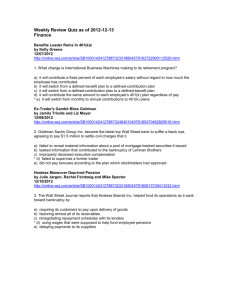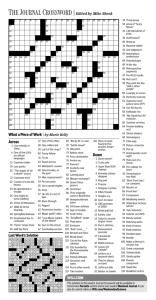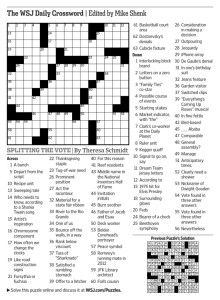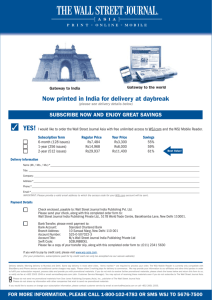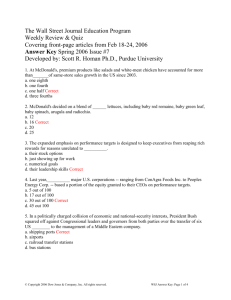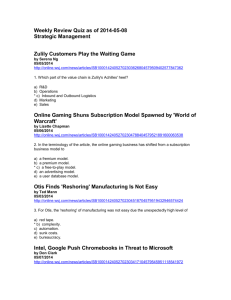USC Marshall - University of Southern California
advertisement
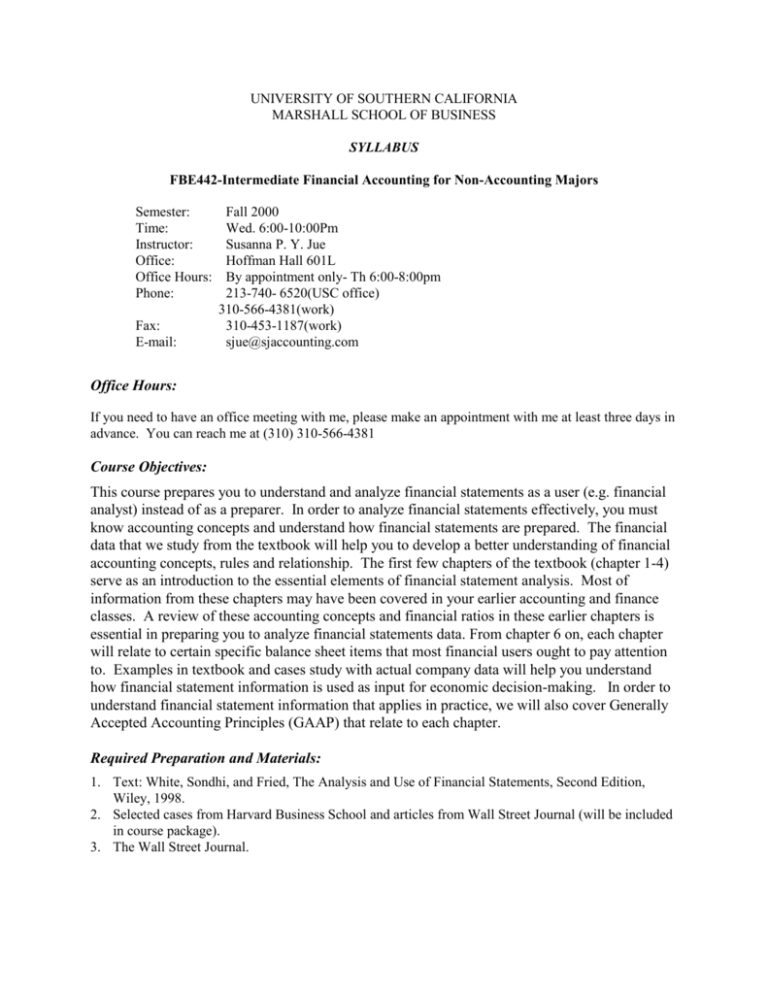
UNIVERSITY OF SOUTHERN CALIFORNIA MARSHALL SCHOOL OF BUSINESS SYLLABUS FBE442-Intermediate Financial Accounting for Non-Accounting Majors Semester: Time: Instructor: Office: Office Hours: Phone: Fax: E-mail: Fall 2000 Wed. 6:00-10:00Pm Susanna P. Y. Jue Hoffman Hall 601L By appointment only- Th 6:00-8:00pm 213-740- 6520(USC office) 310-566-4381(work) 310-453-1187(work) sjue@sjaccounting.com Office Hours: If you need to have an office meeting with me, please make an appointment with me at least three days in advance. You can reach me at (310) 310-566-4381 Course Objectives: This course prepares you to understand and analyze financial statements as a user (e.g. financial analyst) instead of as a preparer. In order to analyze financial statements effectively, you must know accounting concepts and understand how financial statements are prepared. The financial data that we study from the textbook will help you to develop a better understanding of financial accounting concepts, rules and relationship. The first few chapters of the textbook (chapter 1-4) serve as an introduction to the essential elements of financial statement analysis. Most of information from these chapters may have been covered in your earlier accounting and finance classes. A review of these accounting concepts and financial ratios in these earlier chapters is essential in preparing you to analyze financial statements data. From chapter 6 on, each chapter will relate to certain specific balance sheet items that most financial users ought to pay attention to. Examples in textbook and cases study with actual company data will help you understand how financial statement information is used as input for economic decision-making. In order to understand financial statement information that applies in practice, we will also cover Generally Accepted Accounting Principles (GAAP) that relate to each chapter. Required Preparation and Materials: 1. Text: White, Sondhi, and Fried, The Analysis and Use of Financial Statements, Second Edition, Wiley, 1998. 2. Selected cases from Harvard Business School and articles from Wall Street Journal (will be included in course package). 3. The Wall Street Journal. 4. Software: You must be familiar with EXCEL or LOTUS 1-2-3 and word processing software. If you do not yet know how to use EXCEL or LOTUS and word processing software, learn quickly. Keck Center holds free Excel workshops regularly. Optional Materials: Barrons, Business Week, Fortune, or Forbes. Calculator: Since we will compare financial data throughout the semester, you should bring calculator with you to class. Recommended out of class reading for class discussion: Wall Street Journal Expectations: You must know accounting and fulfill all prerequisites before you are taking this class. You should read the assigned chapter prior to class, and completed assigned cases by the due days. All assigned cases must be typed and be legible. Class participation pertains to assigned chapter is encouraged. Keep yourself informed of the current events regarding financial matters often appear in the financial press such as the Wall Street Journal. I encourage you to bring in articles from Wall Street Journal or business magazine that relate to subjects that you will be studying during the semester. The class outline will serve as a guide of what is in the chapters. You should take notes during class. Midterms and final will not be limited only to class outline. You are responsible for any absence from class. If you miss a class session, get notes and materials from your fellow group members. Form a “buddy system.” Arrange for pickup of extra handouts. I will not take responsibility for your absences, nor will I keep extra handouts in my office. Evaluations: Grading will be based on: Class participation Cases study, project & quizzes Midterm Exam (2) Final Exam TOTAL 10% 20% 40% 30% 100% 1. Tests: All tests will consist of problem, essay and /or objective questions (such as true/false and multiple choice questions). The final will be comprehensive. All tests will be closed book. You may use a financial calculator in the test; however, you may not put any course-related material on your calculator. You are required to take all tests administered in this course. ALL TESTS MAY NOT BE MADE UP. If you are unable to take a test, you must obtain my written permission for missing the exam prior to the exam (Detailed requirements are included in Section of Missed Exam Policy under Course Policies). Missed exams are recorded as a zero. 2. Project: More information regarding the project will be discussed and handed out in class. 3. Homework: Homework consists of assigned cases. These assigned cases may or not be graded but must be handed in on time. I will let you know which one will be graded. You should practice the problems follow each chapter. Homework on these chapter problems will not be collected or graded. I will provide you the answers for these problems and you should compare the answers to the problems on your own. We may select some of these chapter problems or cases to cover in class. 4. Class Participation: Class participation is strongly encouraged. Demonstration of knowledge of course material through positive verbal participation in class discussions and attendance to classes can be a significant factor in assigning final grades to students in borderline cases. 5. Extra-Credit Assignments: In fairness to all other students, there will be no extra-credit assignments. Requests for extra-credit assignments to make up for a poor performance on a test will not be granted. 6. Grading Policy: The historical average grade point is 3.0. The current course grade average will be approximated between 2.9 to 3.0. Course Policies: Requests for incomplete grades, action for academic dishonesty, and other administrative actions will be handled according to the policies established by the University and the Marshall School of Business (MSB). 1. Incomplete Policy: Do not ask for a grade of incomplete for the course simply because you are doing poorly in the class. The University and the MSB have established clear-cut and highly restrictive limitations on when the grade of incomplete can be granted, and what the contractual obligations of the parties may entail. Note that an incomplete can only be granted after 12th week. 2. Academic Dishonesty: “The use of unauthorized material, communication with fellow students during an examination, attempting to benefit from the work of another student, and similar behavior that defeats the intent of an examination, or other class work is unacceptable to the University. It is often difficult to distinguish between a culpable act and inadvertent behavior resulting from the nervous tensions accompanying examinations. Where a clear violation has occurred, however, the instructor may disqualify the student’s work as unacceptable and assign a failing mark on the paper.” (SCampus) 3. Exam Policy: All exams are closed book and closed notes. You are required to follow all instructions given on the cover sheet of each test. Failure to do so may result in not receiving credit for correct answers. It is your responsibility to check your test to ensure that no pages are omitted. The cover sheet to each test will explain how many pages there are to the test, how many questions are included in the test, and how many points are assigned to each question. You are responsible to check the number and sequence of the pages of each test. If your test is missing a page, ask the instructor or TAs for a new test. Requests for re-grades because pages are claimed to have been missing from a test will not be honored. Your name should appear on each pages of the test. Exam paper without name may not receive any grade. If you have any questions during a test, raise your hand and ask the instructor your question. No discussion with other class members will be allowed during a test. You may be asked to change seats during a test. This does not necessarily mean that you are suspected of cheating. You may be asked to show proper identification before, during, or after a test. You are required to bring your university student picture identification to each test. No hats or sunglasses may be worn during a test. No partial credit will be awarded for objective questions. The tests will be handed back within two class periods following the test. Any questions regarding grading of a test must be brought to the attention of the instructor no later than the following scheduled class after the test is handed back. There will be no exceptions. Requests for a reread of a question must be made in writing, and returned with the test. If you allege you have taken an exam (or quiz) but have not received a grade, it is your responsibility to inform the instructor of this problem in writing within two class periods after the grades are distributed and posted. Any student not following this procedure will receive a zero for the test. Requests for grade changes for such reason, as “I am only 1 point from a B” will not be considered. If you change your answer on the scantron sheet, it is your responsibility to properly erase any other answers you had previously selected. Scantron sheets that are misgraded because of poor erasure marks will not be re-graded. All grade-inquiry requests must be made in writing within 1 class period after the grades are posted. Your typed-written memo should contain the following information. Be sure to include your 442 ID. (To expedite filing and recording, everyone will be assigned a 442 ID number in the 3rd class meeting. Please have this 442ID number on every assignment and test.) To: Date: Section: From: Re: Professor Jue Nov. 25, 2000 Wed. 6:00-10:00 Jordan, Michael (100) [Last, First Name (442ID)] Midterm 1’s grade Your message (such as your expected outcome of this request). 4. Missed Exam Policy: There will be no make-up exams for all the tests. Students who miss any test will receive the grade of “zero” for that particular test. A missed midterm exam will receive a grade of zero unless the student does the following: (1) a student gives notice to the professor prior to the exam that he or she will be missing an exam, and (2) a legitimate and verified excuse (such as non-elective surgery with written documentation from a certified physician; USC-University Park Health Center will no longer be providing routine medical excuses) is presented to the professor within one week after the exam was administered. If a student does not have a written, acceptable (a common cold is not acceptable), verified excuse for missing either of the midterm exams, or does not give prior notice even with a valid excuse, the student will receive a grade of zero for the missed exam. If a student has a written, acceptable, verified excuse for missing any one of the midterm exams and has given proper prior notice of the excuse, his or her final exam work will count for (40%) of the course grade. Students who miss both midterm exams will automatically receive the grade of “F” for the course if they have not withdrawn from the course. How can you do well in this course? This course requires your strong knowledge in accounting and finance. If you have difficulties in understanding certain topics discuss in the textbook, you are strongly recommended to refer to your previous accounting books or obtain extra reading materials from library. The followings suggestions should also help you to improve in this course: 1. Attend all classes and read before you come to the class meetings. 2. Focus your attention on the lecture and participate as much as you can in the class discussions positively. (I suggest that you do not sit next to your best friends since they can greatly distract you. I also strongly recommend that you do not chat with your neighbor classmates during class meetings. No food or drink will be allowed in class. Beepers and cell phones must be turned off during class meetings.) 3. Ask as many questions as you would like in class; this will help your classmates too. 4. Understand the materials. This includes understanding the lecture, the case study, chapter problems and its solution, and the text. 5. Work on the homework problems regularly and practice the chapter problems regularly. 6. Keep abreast of the current events by reading (at least the cover pages of) the Wall Street Journal. 7. Whenever possible, apply what you have learned to your daily financial life. Finally, I cannot stress enough that it is very critical for you to keep up with the readings, attend classes and solve problems on a regular basis. TENTATIVE COURSE OUTLINE AND ASSIGNED READINGS AND HOMEWORK Date 8-30 Ch 1 Topic Framework for Financial Statement Analysis Cases 9-6 2 Accounting Income and Assets: The Accrual Concept 9-13 3 Analysis of Cash Flow Accounting for Frequent Fliers Circuit City Stores, Inc.(A) Thousand Trails, Inc (case 3-1) 9-20 4 Foundations of Ratio and Financial Analysis 9-27 General Mills, Inc.: Analyzing an Annual Report Midterm exam 1 9-27 10-4 6 6 Analysis of Inventories Analysis of Inventories 10-11 7 10-18 8 Analysis of Long-lived Assets, Part 1: The capitalization Decision Analysis of Long-lived Assets, PartII: Analysis of Depreciation and Impairment 10-25 11-1 11-8 9 10 Analysis of Income taxes Analysis of Financing Liabilities Midterm exam II 11-8 /1115 11 Leases and Off-Balance-Sheet debt Texaco and Caltex (case11-1) 11-15/1122 13 Analysis of Intercorporate Investments Coco Cola(case 131) 11-29 14 Business Combination 12-6 12-13 17 Analysis of Financial statements: A Synthesis Final exam 7:00-9:00pm Homework assignments are due on the next class meeting Nucor (case6-1) Digital equipment(case7-1) Swedish Forest Products Industries(case8-1) Intangible Assests (case9-1) Georgia PacificCNN ( case 14-1) Reading Articles Chapter Articles from Wall Street Journal 1 WSJ, 5-27-98, “Ernst & Young Quits as Outside Auditor…” 2 WSJ, 1-28-98 “Citicorp Net: Special Items…” WSJ, 5-1-97, “Sipping the Fizz in Coca-Cola’s profit” WSJ, 9-30-97, “FASB Rule will Offer Walk…” WSJ, 7-18-97, “Microsoft’s Earnings Hot…” WSJ, 9-16-97, “ Growth Companies Feel…” 7 WSJ, 1-30-96, “Odd Number: Are Companies…” WSJ,12-30-96, “Write-Offs May Become ‘Write on’” 11 WSJ, 2-12-98, “Compaq Deal May…” 12 WSJ, 1-14-97, “As Options Proliferate…” WSJ, 5-22-97, “More Firms Use Options to Gamble on Their Own Stock” WSJ, 6-26-97, “Coming Clean on Company Stock Options” WSJ, 12-4-97, “Microsoft and Its Two Constituencies…” WSJ, 2-1-96, “How Pension Funds Lost in Market Boom” 13 WSJ, 5-13-96, “ADM Originally Set…” 14 WSJ, 12-2-96, “More Firms Write Off Acquisition Costs” WSJ, 10-8-97, “WorldCom Wants Pooling for MCI Deal” WSJ, 4-27-98, “FASB May Change M&A Accounting…” Disclosures WSJ, 3-31-98, “Sudden Departure of …” WSJ, 6-21-96, “Shut Out…” WSJ, 3-6-97, “Trading Picks Up During…” Earnings Management WSJ, 4-3-97, “ How to be a Winner in the Profits Game” WSJ, 11-4-96, “Sears’s Credit-Card Reserves…” WSJ, 4-21-98, “IBM Posts 13% Drop in First-quarter Net”
